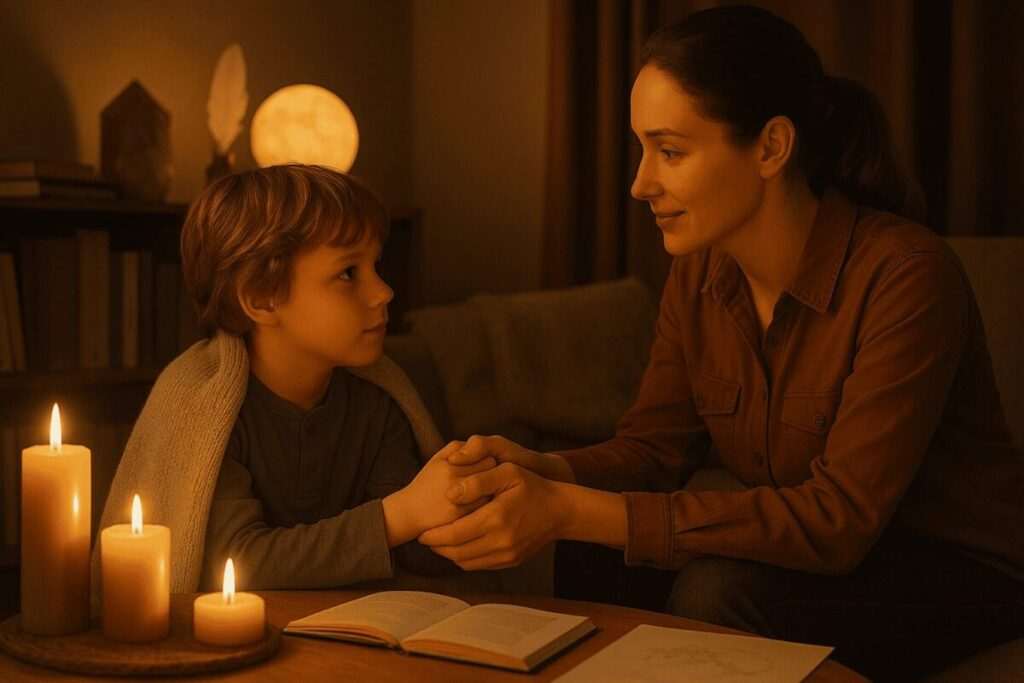My psychic chat
- Home
- Refill my account
- Sign Up
- Log in
- Our blog
Options
- Contact us
- FAQ
- Language
What if your child could perceive the invisible with startling clarity? Some children seem « different. » They ask existential questions from a young age, talk to « imaginary friends » with unsettling precision, describe places they’ve never visited, or sense emotions that don’t belong to them. For many parents, this can be unsettling, even worrying. What if, instead of dismissing it as a passing phase or an overactive imagination, it’s something else? An early spiritual sensitivity. A child who is a medium.
Mediumship in children, though rarely discussed in mainstream educational circles, is widely observed in spiritual and therapeutic communities. These so-called « sensitive » or « connected » children pick up on subtle information that most adults have learned to ignore or suppress. They may sense the energy of a place, perceive someone’s aura, receive spontaneous messages, or demonstrate extraordinary empathy.
This phenomenon isn’t new. Throughout history, many cultures have recognized the existence of « wise » or « visionary » children, often integrating them into special roles. Yet in our modern society, these abilities are frequently misunderstood or even labeled as concerning. Without proper guidance, such sensitivity can become a source of anxiety or confusion for the child.
What signs should alert you without falling into over-interpretation? And most importantly, how do you support your child with compassion, without boxing them into a label, while honoring their unique potential?
In the following sections, we’ll explore how to identify signs of mediumship in children, support them day-to-day, and establish a secure and nurturing framework so this sensitivity remains a gift… not a burden.

All children have heightened sensitivity, but in some, this receptivity crosses a much more subtle threshold. Here are the main signs observed in children with medium abilities:
It’s important to note that these signs, taken in isolation, aren’t enough to make a « diagnosis. » What matters is their intensity, frequency, and especially how the child experiences them. Are they anxious? Curious? Misunderstood?

Early mediumship isn’t a problem. It’s a gift. A language of the soul seeking early expression. The challenge isn’t to silence it, but to nurture it.
Caroline, mother of Leo, age 7
« Leo said a ‘woman in blue’ came to see him at night. At first, we thought it was a nightmare. But it was so precise, so recurring… We consulted a gentle energy healer who helped us understand that Leo was perceiving presences. We established a small protective ritual at bedtime. Since then, he sleeps better and feels heard. He’s no longer afraid. »
Samir, father of Lina, age 10
« Lina has always had extreme sensitivity. One day, she told me she could sense when someone was sad, even if they were smiling. I took her to see a transpersonal therapist who taught her to differentiate between her emotions and those of others. Today, she meditates regularly. She feels better, and so do we. »
Emily, special education teacher
« In my work, I’ve met several children who were labeled ‘troubled’ when they were simply very sensitive to the subtle realm. With compassionate support, these children were able to transform their perception into creative strength. The problem isn’t their mediumship—it’s the lack of understanding around it. »
Not necessarily. Some perceive presences, others sense emotions, hear inner messages, or pick up on symbols. Each mediumship is unique and can evolve over time.
It can be helpful, especially if the child is suffering or seems disturbed. But seek out professionals who are open to the spiritual or energetic dimension, to avoid premature pathologizing.
Yes, you can help them set energetic boundaries. This involves simple rituals, grounding practices, and clear intentions. But the goal isn’t to block, only to learn to manage.
Sometimes it fades during adolescence. Sometimes it strengthens. What matters is that the child has learned to welcome it and use it with respect and balance.
Not always under the « medium » label. But mentioning heightened sensitivity or a need for quiet can help teachers better understand certain reactions.
Some souls, from the moment they arrive, challenge our certainties. They don’t always speak the language of logic, but that of feeling, intuition, and the invisible. These children we call « mediums » may simply be consciousness bridges. Through their pure perceptions, they remind us that reality doesn’t stop at the five senses. They compel us to reopen long-sealed doors: those of the soul, the heart, the subtle.
Supporting a medium child means accepting to kneel before mystery. It’s stopping the need to explain everything, to control everything, and finally allowing yourself to be touched by what can’t be proven, but can be felt. It’s reconciling with our own intuition, often forgotten, muzzled by education or the demands of reason. It’s, in a way, beginning a shared healing journey.
These children aren’t « different. » On the contrary, they’re at the heart of what humanity desperately seeks: a more authentic connection, finer listening, a more vibrant relationship with the world. Their mediumship is neither an anomaly nor a weakness. It’s a strength to be nurtured, a soul language still unknown, but profoundly precious.
By listening to them, you don’t just reassure them. You allow them to stay luminous in a world that dims too quickly. You offer them a space where being themselves is possible, even if that « self » defies comprehension. And in return, you receive a key. One that reopens within you a forgotten sensitivity, a magic you thought lost.
So if one day your child tells you they see what you don’t see, don’t correct them. Listen. Ask questions. Caress their imagination without crushing it. Give them guidance, yes, but never walls.
Because perhaps by offering this listening, you’ll do far more than help them: you’ll learn, alongside them, to see the world differently. To remember that true intelligence isn’t always what we teach… but what feels, intuits, and loves beyond forms.
What if, ultimately, it wasn’t your child who needed « educating »… but you whom they came to awaken?